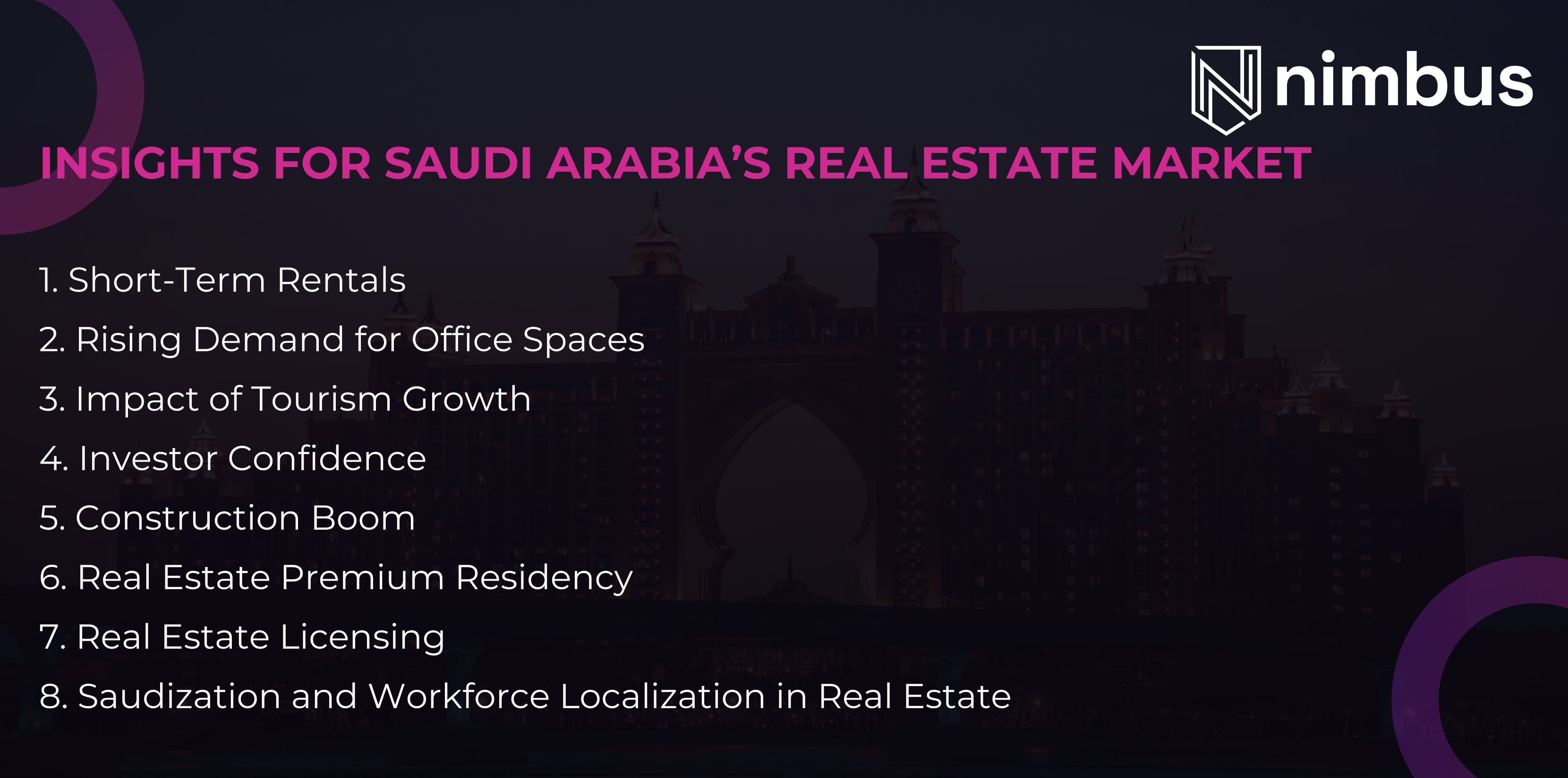Saudi Arabia’s real estate sector is undergoing a rapid transformation, driven by economic reforms, foreign investment incentives, and increasing demand for commercial, residential, and industrial spaces.
Real estate has become a crucial pillar in its diversification efforts, attracting global investors, corporate expansions, and large-scale infrastructure projects.
For investors looking for profitable business incorporation in Saudi Arabia, understanding the latest trends, regulatory shifts, and emerging opportunities is essential. This blog explores the KSA’s real estate market, its growth factors, and investment opportunities, among others.
INSIGHTS FOR SAUDI ARABIA’S REAL ESTATE MARKET
1. Short-Term Rentals .
Saudi Arabia’s decision to mandate regional headquarters (RHQ) requirements for foreign companies in 2024 has significantly increased demand for office spaces and executive housing.
This policy has created a ripple effect across the real estate sector. One of the most notable impacts has been the rise of short-term rental properties, further driven by growing need for high-quality accommodations by expatriates and tourists. Here are some market insights.
- The vacation rental market is expected to reach 5.39 million users by 2028, with Airbnb and HomeAway expanding operations.
- A new bylaw by the Ministry of Tourism allows Saudi citizens to rent their homes to tourists, further boosting supply.
2. Rising Demand for Office Spaces
Saudi Arabia’s office space market has witnessed remarkable growth, particularly in major cities like Riyadh, Jeddah, Dammam, and Khobar. Given below are some interesting stats.
Riyadh’s office space demand grew by 23.6% in Q3 2023, with 92% occupiable supply being utilized. A shortage of premium office spaces and strategic industrial locations has fueled the real estate growth, presenting attractive investment opportunities for commercial developers and landlords.
3. Impact of Tourism Growth
Saudi Arabia’s tourism sector is booming, creating strong demand for hotels, resorts, and residential properties.
- The Kingdom attracted 27 million foreign tourists in 2023, with a goal of 150 million annual visitors by 2030.
- Contracts have been signed to develop 75,000 new hotel rooms, with a target of 550,000 by 2030.
This expansion is expected to create significant investment opportunities in luxury residences, serviced apartments, and commercial tourism hubs.
4. Investor Confidence
The Real Estate Future Forum in early 2024 showcased strong investor confidence, with SAR 100 billion in agreements and MoUs signed. Furthermore, Riyadh’s population is expected to increase by 127% by 2030, driving further demand for housing and commercial properties.
With government support, financing reforms, and urban development initiatives, the outlook for Saudi Arabia’s real estate sector remains highly promising.
5. Construction Boom
Saudi Arabia has one of the largest construction markets in the Middle East and the numbers below highlight the fact.
- More than 1.3 million new homes are planned by 2030 to accommodate the growing population.
- The construction sector is expected to contribute 8.8% of Saudi Arabia’s GDP by 2030.
This creates opportunities for construction firms, real estate developers, and investors looking to capitalize on large-scale urban projects.
6. Real Estate Premium Residency
In a strategic move to attract long-term foreign investors, Saudi Arabia introduced a Real Estate Premium Residency program.
Eligibility Criteria:
- Minimum real estate investment of SAR 4 million.
- Property must be free from mortgages and real estate financing.
- Only developed residential properties qualify (undeveloped land is excluded).
- Assets must be appraised by accredited valuers from Taqeem.
Benefits of Real Estate Premium Residency:
- Residency for family members, including parents, spouse, and dependents under 25.
- No expat fees for the residency holder and dependents.
- No exit/re-entry visa requirements for residents.
- Exclusive airport privileges and simplified visa procedures for relatives.
This initiative further positions Saudi Arabia as a prime destination for international real estate investors, offering security, business opportunities, and residency benefits.
7. Real Estate Licensing
To attract foreign investment, Saudi Arabia has streamlined its real estate licensing framework, allowing full foreign ownership in brokerage services and real estate-related businesses.
Investment Licensing Opportunities:
- Buying, selling, and leasing residential and commercial properties.
- Real estate development using modern construction methods.
- Real estate brokerage and valuation services.
- Self-storage management and real estate consultancy.
- Construction of residential and non-residential buildings, including hotels and schools.
In July 2023, the Real Estate General Authority (REGA) announced a 100% foreign ownership reform in real estate brokerage, further supporting economic diversification and private sector collaboration.
8. Saudization and Workforce Localization in Real Estate
As part of Saudi Arabia’s economic localization strategy, the government is actively increasing Saudi participation in the real estate sector. The Waad national training program aims to provide 1.15 million training opportunities for Saudis by 2025. This presents opportunities for companies to engage with local talent while ensuring compliance with Saudization requirements.
Why Investors Should Act Now?
Saudi Arabia’s real estate sector is at the forefront of economic transformation, backed by strong policies, incentives, and a booming tourism and construction industry.
For foreign investors, now is the time to explore company formation services in Saudi Arabia in real estate sector, whether in commercial property, short-term rentals, industrial properties, or luxury residential developments.




